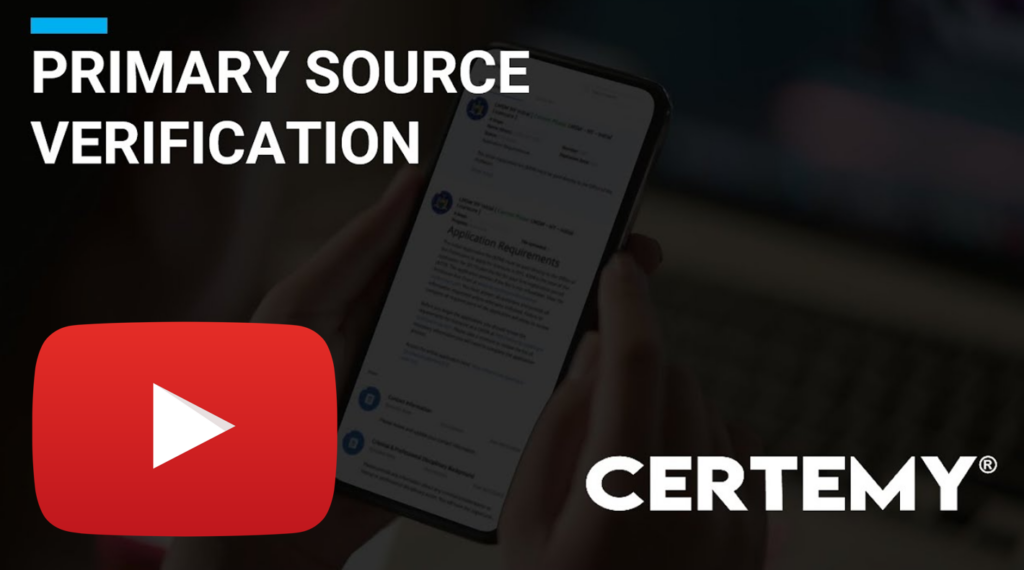
License Verification Tool | HHCNS – Home Health Clinical Nurse Specialist
The role of the Home Health Clinical Nurse Specialist (HHCNS) is essential to providing quality health care within the home health setting. While this type of clinical care provider is often underestimated, HHCNSs are certified and often possess advanced nursing certification, such as Family Nurse Practitioner (FNP). Clinical Nurse Specialists are expected to bring their level of expertise to guide their patients with the best possible care.
The importance of primary source verification, or PSV, for HHCNSs cannot be stressed enough. Such verification ensures that clinical nurse specialists are fully qualified and competent to provide the services they are hired to provide. Primary source verification is especially beneficial when verifying a health care professional?s credentials. It helps employers ensure that their health care staff is competent, experienced, and qualified to offer quality patient care.In this article, we will discuss the importance of primary source verification for the Home Health Clinical Nurse Specialist, how the process works, and its benefits to the health care team.What is Primary Source Verification?Primary source verification is the process of ensuring that a person holds the credentials they claim to have. It is used to validate the credentials of health care practitioners, such as nurses, doctors, and HHCNSs. This type of verification is completed by a dedicated professional who reviews the claims of the health care practitioner. The goal is to ensure that the information about the practitioner is accurate and up to date. This includes checking that the practitioner has the necessary educational requirements, certifications, licensure, and any applicable experience.Verifying a medical professional?s credentials through primary source verification is the most reliable way to prevent fraud and ensure patient safety. The need for primary source verification is now more urgent than ever as health care environments are becoming increasingly complex and the number of practitioners involved in the health care industry continues to rise.Why Primary Source Verification is Important for HHCNSsPrimary source verification plays an important role in the home health setting, especially for HHCNSs. Since HHCNSs provide specialized care in the home health setting, it is essential that they have the required credentials and certifications in order to provide the highest level of care.When hiring HHCNSs, employers must perform a primary source verification process to confirm whether or not the candidate possesses the necessary qualifications. Such verification ensures that the HHCNS is certified, experienced, and knowledgeable to provide quality home health care. It also helps employers mitigate their risk and meet regulatory compliance requirements.How to Perform Primary Source Verification for HHCNSsFortunately, primary source verification for HHCNSs is not a complicated process. It begins with the employer verifying the candidate?s credentials, such as their certificate or license. This information can be obtained from the practitioner?s state board, or by contacting the health care professional?s school or program.The next step is to review the current registry or database in the state or country where the health care practitioner is located, to determine if the practitioner is currently certified, licensed, or registered in their state or country. This process helps to confirm that the practitioner is not suspended or has any disciplinary actions against them. Additionally, it is a good practice to review the health care practitioner?s references to ensure they are competent and professional, and to speak with state or national organizations to obtain additional information about the practitioner.The Benefits of Primary Source Verification for HHCNSsIn addition to helping employers ensure that the practitioners they are hiring are adequately qualified to provide home health care, primary source verification offers several other benefits. This includes increasing patient safety by ensuring that practitioners have the right credentials and experience, as well as reducing the workload of health care administrators.By verifying the credentials of their practitioners, health care employers can ensure that their team is working at their peak level of competency, that they are providing safe and effective care, and that they are compliant with all applicable regulations. Ultimately, this helps to create a more successful health care team and a safer patient experience.Topics:

